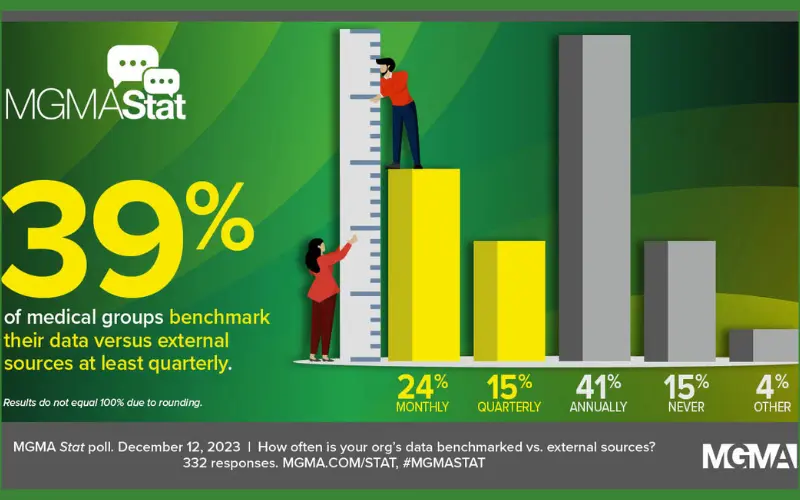MGMA Healthcare 2024 Update

What is MGMA Healthcare?
MGMA, which stands for Medical Group Management Association, plays a crucial role in shaping healthcare management practices across medical practices and organizations in the United States. It provides guidelines, standards, and resources aimed at improving operational efficiency, financial performance, and overall patient care quality within medical groups.
Medical Group Management Association focuses on offering valuable insights and tools that help healthcare administrators and managers navigate the complex landscape of healthcare delivery. By adhering to MGMA standards, medical practices can streamline their operations, optimize revenue cycles, and enhance patient satisfaction.
History and Evolution of MGMA
Founded in 1926, MGMA has a rich history rooted in supporting healthcare professionals with management expertise. Initially established as the National Association of Clinic Managers (NACM), it evolved over the decades to encompass a broader spectrum of medical group management practices.
Throughout its history, MGMA has adapted to changes in healthcare policies, technological advancements, and shifts in patient care dynamics. It has consistently provided educational resources, benchmarking data, and advocacy efforts to help medical practices thrive in a challenging healthcare environment.
Today, MGMA continues to be a leading authority in healthcare management, offering a wide range of services including professional development programs, networking opportunities, and industry research. Its influence extends across thousands of medical practices, influencing policies and practices that shape the future of healthcare administration.
Importance of MGMA in Healthcare Management
The Medical Group Management Association (MGMA) plays a pivotal role in healthcare management by providing essential resources and support to medical practices and healthcare organizations. Founded on principles of excellence in practice management, MGMA offers valuable insights into optimizing operational efficiency, financial performance, and overall patient care delivery. By facilitating networking opportunities, educational programs, and access to industry benchmarks and best practices, MGMA enables healthcare professionals to stay abreast of regulatory changes, technological advancements, and strategic innovations that impact their practices.
Moreover, MGMA fosters collaboration among healthcare leaders, fostering a community-driven approach to tackling common challenges and advancing healthcare quality. Ultimately, MGMA serves as a cornerstone for healthcare management excellence, empowering organizations to navigate complexities, enhance organizational performance, and ultimately improve patient outcomes in an ever-evolving healthcare landscape.
Key Benefits of Implementing MGMA Standards
Implementing MGMA standards helps medical practices achieve operational excellence by improving workflow efficiency, optimizing revenue cycles, and reducing administrative burdens. It facilitates better decision-making through data-driven insights and benchmarks, ultimately leading to improved patient outcomes and organizational growth.

Challenges and Considerations in MGMA
Adopting the practices and recommendations of the Medical Group Management Association (MGMA) comes with several challenges and considerations that healthcare organizations must navigate:
- Resource Allocation: Implementing MGMA guidelines often requires significant financial and human resources. Practices may need to invest in new technologies, training programs, and infrastructure upgrades to meet MGMA standards for operational efficiency and patient care.
- Change Management: Healthcare organizations must manage the cultural and operational changes that come with adopting MGMA principles. Resistance to change among staff, existing workflows, and entrenched practices can hinder effective implementation.
- Data Security and Privacy: As healthcare becomes increasingly digital, ensuring the security and privacy of patient information is paramount. MGMA’s recommendations may involve using electronic health records (EHRs) and other digital tools, necessitating robust cybersecurity measures and compliance with regulations like HIPAA.
- Integration and Interoperability: Integrating new technologies and systems recommended by MGMA into existing workflows can be complex. Ensuring seamless interoperability between different platforms (EHRs, practice management systems, telehealth solutions) is crucial for maintaining continuity of care and operational efficiency.
- Training and Education: Staff members may require training to effectively utilize new technologies and workflows advocated by MGMA. Continuous education and professional development are essential to maximize the benefits of adopting MGMA guidelines.
- Regulatory Compliance: MGMA’s recommendations often align with current healthcare regulations and best practices. However, staying compliant with evolving regulatory requirements can be challenging, requiring ongoing monitoring and adaptation.
- Cost Management: While MGMA’s practices aim to improve efficiency and reduce costs in the long term, initial investments in technology and process improvements can strain budgets, particularly for smaller practices or those with limited financial resources.
- Patient and Provider Satisfaction: Changes implemented based on MGMA guidelines should ultimately enhance patient care and provider satisfaction. Balancing operational improvements with maintaining high-quality patient interactions and provider autonomy is critical.
Navigating these challenges requires careful planning, stakeholder engagement, and a phased approach to implementation. Despite these considerations, adopting MGMA practices can ultimately lead to improved operational efficiency, enhanced patient care outcomes, and better financial performance for healthcare organizations committed to continuous improvement and excellence in management.
Best Practices for Successful MGMA Implementation
Successful MGMA implementation involves thorough planning, stakeholder engagement, and alignment of organizational goals with MGMA benchmarks. It includes ongoing education and training for staff, leveraging technology for streamlined operations, and regular performance monitoring to track progress and ensure compliance.
Future Trends and Innovations in MGMA
Looking ahead, the Medical Group Management Association (MGMA) is poised to embrace several key trends and innovations that will shape the future of healthcare management:
- Data Analytics and AI: As healthcare generates vast amounts of data, MGMA is increasingly focusing on leveraging advanced analytics and artificial intelligence (AI) to derive actionable insights. Predictive analytics can help practices forecast patient volumes, optimize staffing, and improve revenue cycle management.
- Telehealth Integration: The COVID-19 pandemic accelerated the adoption of telehealth, and MGMA continues to explore how to integrate virtual care into practice management seamlessly. This includes optimizing workflows, ensuring reimbursement compliance, and maintaining high-quality patient care standards.
- Patient-Centric Care Models: MGMA is advocating for and supporting the transition towards patient-centric care models, which prioritize personalized, holistic care experiences. This involves enhancing communication channels, fostering patient engagement, and incorporating patient feedback into practice improvement strategies.
- Value-Based Care Initiatives: With a shift towards value-based care reimbursement models, MGMA is guiding practices in transitioning from fee-for-service to outcomes-based payment structures. This includes implementing quality improvement programs, measuring patient outcomes, and managing population health effectively.
- Technology Integration and Interoperability: MGMA recognizes the importance of seamless interoperability between different healthcare technologies and systems. Emphasizing interoperable electronic health records (EHRs), telehealth platforms, and practice management systems ensures continuity of care and operational efficiency.
- Workforce Development and Well-being: Recognizing the critical role of healthcare professionals, MGMA is investing in workforce development programs that enhance leadership skills, promote diversity, and support employee well-being. This includes initiatives to combat burnout and improve work-life balance.
- Regulatory Compliance and Advocacy: MGMA continues to advocate for its members on regulatory issues affecting healthcare management. This includes navigating complex regulatory landscapes, advocating for fair reimbursement policies, and ensuring compliance with evolving healthcare laws.
By embracing these future trends and innovations, MGMA is positioning itself as a forward-thinking leader in healthcare management, dedicated to empowering practices to thrive in an increasingly complex and dynamic healthcare environment.

Conclusion:
In conclusion, MGMA Healthcare represents a pivotal resource for medical practices aiming to enhance their operational efficiency, financial performance, and patient care quality. Throughout this article, we’ve explored the evolution of MGMA from its inception to its current role as a guiding force in healthcare management. We’ve highlighted the importance of adopting MGMA standards, the key benefits they offer, as well as the challenges and best practices associated with their implementation.
By implementing MGMA standards, medical practices can streamline operations, improve decision-making through data-driven insights, and ultimately enhance patient outcomes. As healthcare continues to evolve, staying aligned with MGMA guidelines ensures practices remain competitive and compliant in a rapidly changing landscape.
Call to Action:
Explore how MGMA Healthcare can transform your medical practice today. Whether you’re looking to optimize operations, improve financial performance, or enhance patient care, integrating MGMA standards can provide the framework you need to succeed. Start by assessing your current practices against MGMA benchmarks and discover the potential for growth and efficiency in your organization.
FAQs (Frequently Asked Questions):
Q1: What does MGMA stand for? A1: MGMA stands for Medical Group Management Association, a professional association dedicated to supporting healthcare administrators and managers.
Q2: What are the benefits of implementing MGMA standards? A2: Implementing MGMA standards can help medical practices improve operational efficiency, optimize revenue cycles, and enhance patient care quality through best practices and benchmarks.
Q3: What are some challenges in adopting MGMA standards? A3: Challenges may include initial implementation costs, resistance to change among staff, and integrating new processes into existing workflows. However, these can be overcome with proper planning and stakeholder engagement.
Q4: How can medical practices stay updated with MGMA trends and innovations? A4: Medical practices can stay updated with MGMA trends by participating in MGMA conferences, accessing their educational resources, and networking with peers in the healthcare management field.
Q5: What is the future outlook for MGMA in healthcare management? A5: The future of MGMA includes integrating advanced analytics, artificial intelligence, and telehealth solutions to further improve healthcare management practices and patient outcomes.


![InTown Homes [Affordable Luxury and Comfort]](https://webbezz.xyz/wp-content/uploads/2024/06/InTown-Homes-768x480.webp)
![Meritage Homes [Comprehensive Guide 2024]](https://webbezz.xyz/wp-content/uploads/2024/06/Meritage-Homes-768x480.webp)

![Vehicles for Veterans [5 Steps to Donate Your Vehicle]](https://webbezz.xyz/wp-content/uploads/2024/06/Vehicles-for-Veterans-768x480.webp)